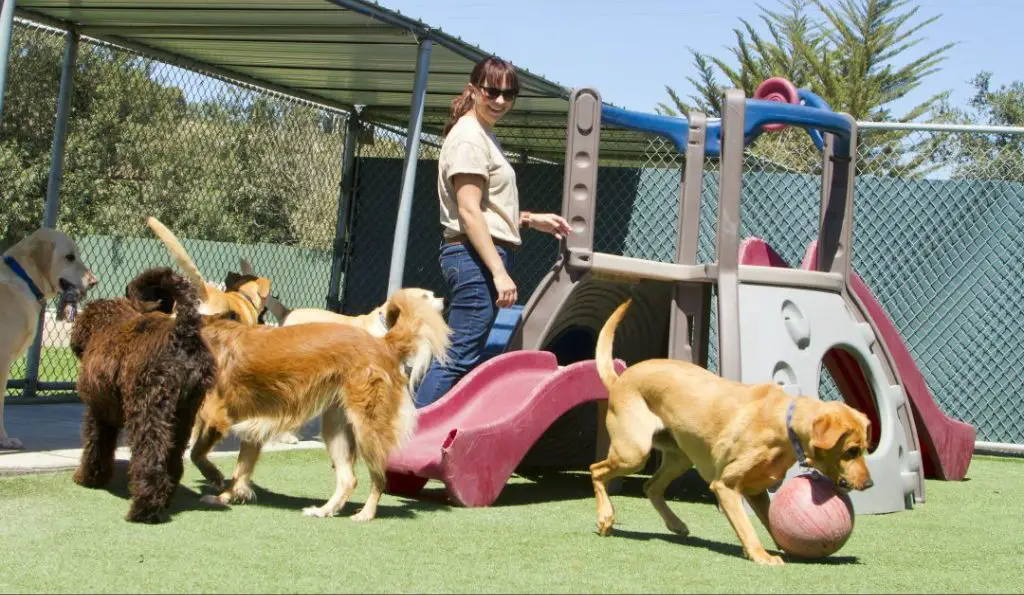Understanding the Situation
Dogs bark for many reasons, including boredom, separation anxiety, or reacting to various stimuli like people walking by or other dogs barking. According to research, nuisance barking affects 1 in 3 dogs worldwide.
Excessive barking can greatly impact neighbors, causing stress and sleep disruptions. If the barking occurs at night, it can be especially problematic.
Before taking any major actions, it’s important to speak with the dog’s owner first if you have not already. Gauge their response to the barking – are they aware of the extent of it? Are they apologetic and willing to address it? Their level of response can help determine the next best steps.
Approaching Your Neighbor
The first step in resolving any neighbor disagreement is to have a friendly conversation. Go over and talk to your neighbor face-to-face to explain the noise problems in a kind, understanding manner. Start by letting them know you wanted to get their contact information in case of future emergencies in the neighborhood, then bring up the barking issue. Be clear on how the barking affects your daily activities, while also remaining considerate of their situation.
Rather than demanding they resolve the issue, suggest constructive solutions like more walks, mental stimulation toys, or professional training. If possible, offer to assist with costs for training sessions or equipment like anti-bark collars. Your neighbor will be more receptive to finding a resolution if you come from a place of assistance rather than criticism. With patience and mutual effort, a compromise can usually be reached where their dog gets enough activity and attention while also allowing you peaceful enjoyment of your home.
Remember to maintain a friendly relationship by communicating calmly and clearly. With good intentions on both sides, you can find a solution that works for everyone involved, both owner and neighbor. For more tips, see this helpful guide on talking to your neighbor about their dog’s barking: [1]

[1] https://ultimatebarkcontrol.com/blogs/news/how-to-talk-to-your-neighbor-about-their-barking-dog
Reducing Stimuli
One of the most effective ways to stop a dog from barking is to reduce the stimuli that trigger the barking in the first place. Dogs commonly bark at visual triggers like fences, windows, and passing people or animals. They also bark in response to loud noises. You can reduce this stimuli in a few key ways:
Block visual triggers by covering fencing or lower window areas where your dog can see movement outside. You can use decorative fencing, opaque window film, curtains, or blinds. This removes the visual stimuli that often trigger barking episodes.
Use noise cancellation devices or play ambient background noise to drown out noises from outside that may cause your dog to bark. White noise machines, fans, music, or TV can help cancel noise that filters into your home. This reduces the auditory stimuli and likelihood of barking (https://www.rover.com/blog/surefire-ways-to-stop-dog-barking/).

By reducing the external stimuli your dog reacts to, you remove common bark triggers from their environment. This can drastically cut down on excessive or nuisance barking without the need for extensive training.
Training Tools
There are various tools that can help train dogs to bark less. Spray collars detect barking and emit a spray of citronella or unscented air to interrupt and deter barking. While not harmful, the spray surprises dogs and disrupts the barking pattern. Ultrasonic devices also detect barking and emit high-frequency sounds that are unpleasant and get a dog’s attention. These tools can be effective for some dogs, but others may become accustomed or ignore the stimuli over time.[1]
Treat-dispensing toys provide positive reinforcement by rewarding quiet behavior. These toys keep dogs engaged and distracted from barking. Providing sufficient physical and mental stimulation is key to reducing boredom barking. Fenced areas allow dogs a safe space to enjoy the outdoors while keeping them from reacting to passersby.[2] Containment helps control external stimuli that can trigger excessive barking. Used alongside training, these tools can help teach dogs to bark less.
[1] https://www.akc.org/expert-advice/training/bark-control-tools-to-help-stop-nuisance-barking/
[2] https://www.amazon.com/Best-Sellers-Sonic-Bark-Deterrents/zgbs/pet-supplies/3024231011
Seeking Mediation
If the situation continues to escalate and direct conversations with your neighbor don’t resolve the issue, consider seeking mediation assistance through community resources.
Many communities have dispute or resolution centers that can provide neutral third-party mediation free of charge. These centers have experience facilitating constructive conversations and negotiating compromises between neighbors over issues like barking dogs. They can suggest solutions, put agreements in writing, and provide enforcement if needed (AKC).
You can also file a formal noise complaint with your local government or police department. This creates an official record and may prompt a visit from law enforcement. However, this can be an antagonistic move that damages neighborly relations, so only use as a last resort if mediation fails (Nolo).
Seeking neutral third party mediation can help you and your neighbor communicate constructively to find an agreeable solution. But more aggressive measures like noise complaints should only be used when all else fails.
Landlord Intervention
If you rent your home, you may have options for addressing a neighbor’s barking dog through your landlord or property manager. Checking your lease agreement is the first step. Many leases include restrictions on pets, noise levels, and disruptive activities.
Pet policies vary widely between rental properties. Some prohibit pets entirely or limit the type, size, or number allowed. Others require paying a pet deposit or monthly pet fee. Review your lease and see if the neighbor is violating any pet-related clauses. Sometimes barking dogs violate general nuisance or noise clauses too.
If so, notify your landlord in writing. Explain the barking issue, cite the relevant lease terms, and request help resolving the problem. Many landlords will contact the tenant and demand the dog’s removal or take steps like seeking eviction if it persists. They want to maintain a peaceful living environment.
Apartments and condos may have homeowners’ associations (HOAs) with rules regarding pets. The HOA could get involved and take action against owners with disruptive dogs. Check their regulations for relevant provisions you can reference in complaints.
Citing lease rules and HOA terms when contacting your landlord lends weight to your request for help. But understand they are limited in what they can do besides contacting the tenant and threatening eviction for ongoing issues. Getting authorities or animal control involved may be necessary if the landlord’s efforts are unsuccessful.
Alternative Housing for the Dog
If the main cause of your neighbor’s dog barking excessively is due to separation anxiety or boredom from being left alone all day, suggesting alternative housing arrangements during the daytime hours may help. According to this source, doggie daycares can provide mental stimulation, exercise, and socialization for dogs that are prone to barking when home alone. Doggie daycares often have webcams so owners can check on their dogs during the day for added peace of mind.

For longer absences like vacations or work trips, boarding facilities and pet sitters that stay in the home can eliminate separation anxiety triggers. According to this source, pet sitters are ideal for anxious dogs since the dog remains in their normal home environment versus being kenneled. Boarding may be stressful for some dogs. If suggesting alternative housing, present it to your neighbor as a collaborative way to achieve more peace and quiet for all.
Hiring a Trainer
If your neighbor is unable or unwilling to control their dog’s barking, hiring a professional trainer may be the best solution. According to Bark, dog trainers typically charge between $30-$125 per hour, with private sessions generally more expensive than group classes. You can expect to pay $30-$60 per hour for puppy training and $55-$125 for more intensive aggression or behavior modification training.

Airtasker notes that group classes provide opportunities for socialization, while private sessions allow the trainer to focus on specific behavior issues like excessive barking. Trainers use techniques like counterconditioning and desensitization to change the dog’s response to stimuli. With consistent training, the dog can learn to control its barking around common triggers.
Hiring a professional trainer to work directly with your neighbor’s dog is often the most effective solution when dealing with nuisance barking. Though not inexpensive, a trainer can provide personalized training tailored to the dog’s unique issues and situation.
Legal Action
If the barking persists despite your reasonable efforts to resolve the issue amicably, you may need to resort to legal action. There are a few potential avenues to explore:
Local noise ordinances – Many municipalities have laws prohibiting excessive dog barking and noise disturbances. You can research the specific ordinance in your area and potentially file a complaint with animal control or the police. Violators may face fines or other penalties if found guilty. See the noise ordinance for [your city] for specifics.
Nuisance laws – You may have a legal case against your neighbor for creating a nuisance if the barking dog severely impacts your ability to enjoy your own property. Nuisance claims related to barking dogs often argue that the noise interferes with quiet use and enjoyment. To have a strong claim, you’ll need evidence like barking logs, audio/video recordings, and corroboration from other neighbors. If successful with a nuisance lawsuit, you may recover damages or get an injunction ordering the owner to stop the disturbance. Refer to [your state] nuisance law §XXX for details.
Small claims court – In most states, small claims court handles cases under a certain dollar amount, like $5,000 or $10,000. You don’t need an attorney and can file a claim yourself seeking monetary damages related to the barking. To win, you’ll still need solid evidence of ongoing unreasonable noise and resulting harm. Any amount awarded will likely be on the smaller side. Get guidance on the small claims process for [your county] court.
Living in Harmony
Having a neighbor’s dog that barks frequently can be frustrating, but it’s important to handle the situation with patience and understanding. Retaliating or escalating the conflict won’t solve the problem – it will only make tensions worse. The best approach is to focus on finding a resolution, not getting revenge.
Remember that the dog’s owner may not even be aware of the barking issue if they are not home during the day. Give them the benefit of the doubt and approach them politely to discuss solutions, like keeping the dog indoors while they are away. If the owner refuses to address the problem, document the barking and contact local authorities, but avoid hostile interactions with your neighbor directly.
Preserving neighborly relations should be the priority. Annoying barking aside, you may otherwise have a perfectly pleasant neighbor relationship worth protecting. With some mutual understanding and noise reduction efforts, you may be able to reach a compromise that allows you both to live in harmony.